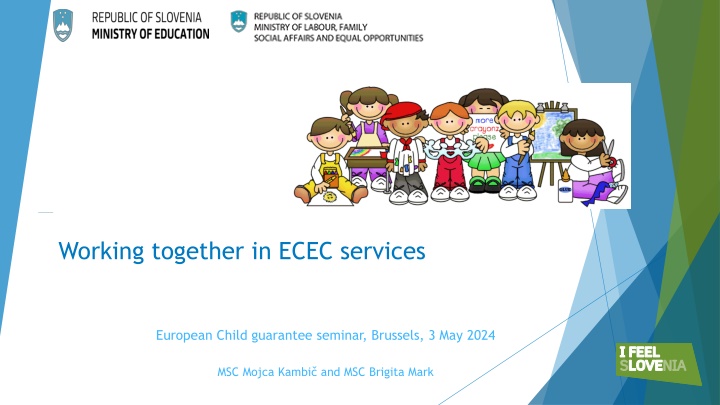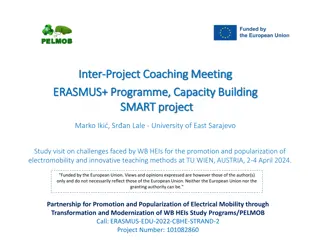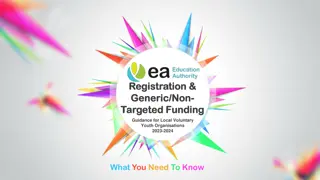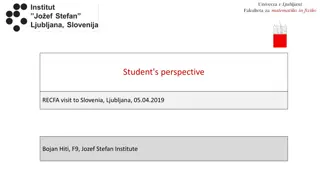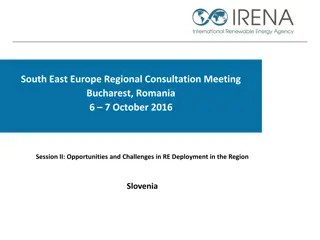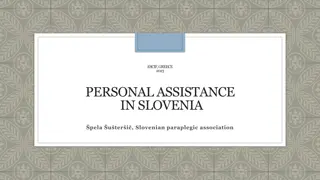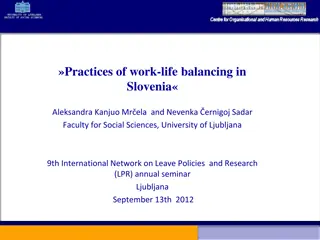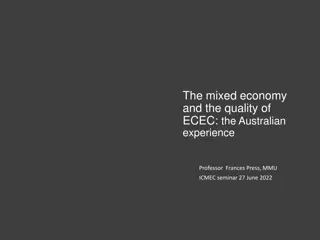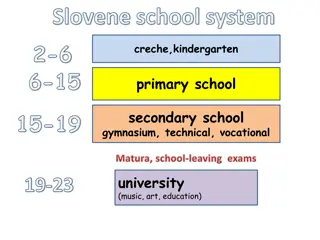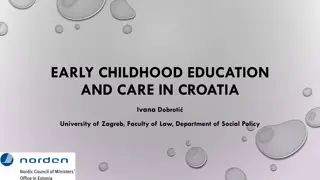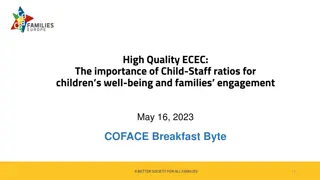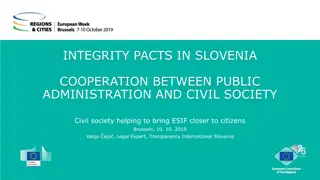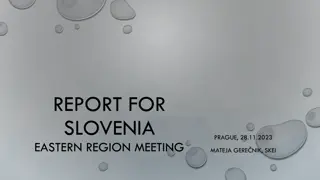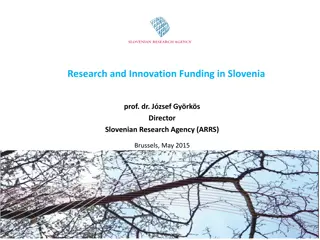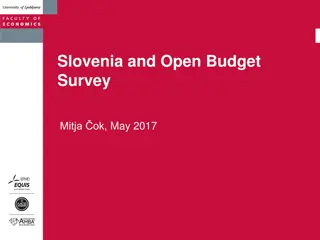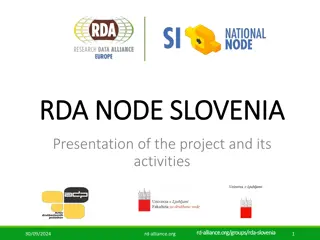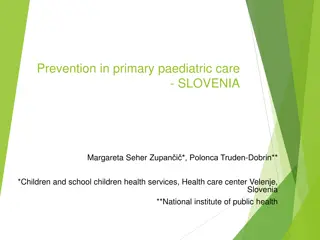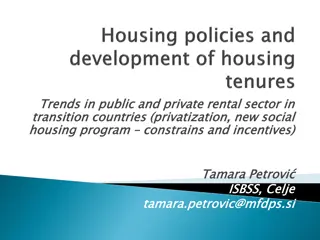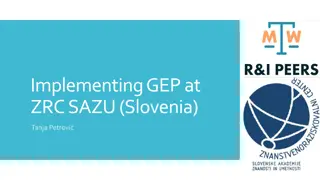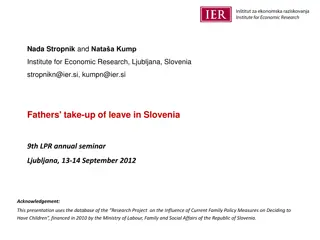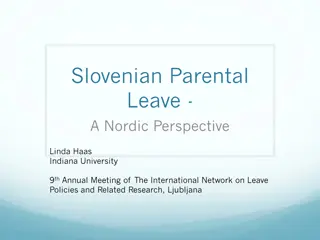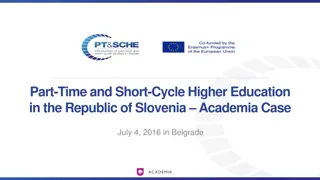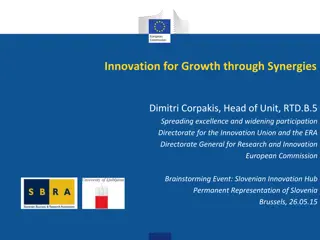Overview of ECEC Services and Funding in Slovenia
ECEC services in Slovenia cater to children from age 1 to 6, with preschool education falling under the Ministry of Education since 1993. The organization of ECEC includes two age groups, with public programs following the national curriculum. Funding primarily comes from municipality budgets and parents' fees, with state contribution and other sources playing a role. The workforce structure, including pre-school teachers and assistants, is regulated by the state, and the Slovenian Child Guarantee National Action Plan focuses on integrating vulnerable children into the ECEC system through strategic measures and interventions.
Uploaded on Sep 30, 2024 | 0 Views
Download Presentation

Please find below an Image/Link to download the presentation.
The content on the website is provided AS IS for your information and personal use only. It may not be sold, licensed, or shared on other websites without obtaining consent from the author.If you encounter any issues during the download, it is possible that the publisher has removed the file from their server.
You are allowed to download the files provided on this website for personal or commercial use, subject to the condition that they are used lawfully. All files are the property of their respective owners.
The content on the website is provided AS IS for your information and personal use only. It may not be sold, licensed, or shared on other websites without obtaining consent from the author.
E N D
Presentation Transcript
Working together in ECEC services European Child guarantee seminar, Brussels, 3 May 2024 MSC Mojca Kambi and MSC Brigita Mark
ECEC in Slovenia Not compulsory for children Includes children from age 1 (11 months) to 6 84,6 % of children are in kindergartens (SURS, school year 2022/23) 95 % of five year old was attending pre-school education ET 2030 goal: 96 % enrollment of children from 3 years to 6 years in ECEC (second age period 93,1 % for 2022/23)
ECEC in Slovenia Preschool education: under the jurisdiction of the Ministry of Education since 1993 Public kindergartens are founded by municipalities in line with the needs of the local population. They may be independent institutions (108) or operate as units of basic schools (208). The public network of kindergartens is complemented by private kindergartens (97). The national government subsidises municipalities budget and plays a regulatory and a supervisory role.
Organization of ECEC in Slovenia Two age groups I. age group: Till 3 years old (12+2) II. age group: From aged 3 years to 6 (22+2) kindergarten teacher plus assistant in every group Public program should follow national curriculum (http://www.mizs.gov.si/en/legislation_and_documents ) Private programs should be adopted by Education Council Program encompass education, care and meals (breakfast, lunch & two snacks).
Funding of ECEC in Slovenia municipality budgets - (65 %) parents fees (depending on their economic situation) (25 %) other sources State (15 %)
Pre-school education staff Public servants regulated from the state Preschool education staff: pre-school teacher (ISCED 6 (2011)) pre-school assistant (ISCED 3 (2011)) in the group Same time presents in group I. age group at least 6 hours II. age group at least 4 hours Counsellors Management
ECEC services in Slovenian Child Guarantee National Action Plan NAP was prepared by the intersectoral working group, with representatives from four key ministries. Measures regarding ECEC services were proposed by the representative from the Ministry of Education in close cooperation with experts from the Ministry and other institutions. A common goal was to facilitate the integration of vulnerable children into the ECEC sytem. Designing interventions: what works and what doesn't work in the system, which pilot measures have already worked well and could be replicated, which target groups of children need additional measures.
Some ECEC measures from the Slovenian Child Guarantee National Action Plan REDUCED KINDERGARTEN FEES TO FACILITATE ACCESS TO PRESCHOOL EDUCATION kindergarten fees are determined according to the income bracket of the child s parents; 9 income brackets; parent fees range from 0% to 77% of the programme price (parents in the highest income brackets pay max. 410 per child aged 11m-3y /316 per child aged 3y-6y); ECEC is free for: lowest-income children and for children of parents receiving social assistance benefit in cash; for children in foster care; for second child in the family concurrently enrolled in ECEC (regardless of their socio-economic status); for third/fourth child in the family (regardless of their socio- economic status).
A FREE PRESCHOOL EDUCATION PROGRAMME OF 240 HOURS Programme for five-year-old children (in the year before they enter primary school) and their younger four-year-old siblings who have not yet been included in the preschool education system. More flexible form of preschool education programmes that contributs to a softer transition of children to compulsory primary education. Programmes are tailored to the interests and needs of the different target groups of parents and children. Free of charge for parents (regardless of their socio-economic status). Special attention has been devoted to children from vulnerable groups, also lower norm for such kindergarten classes has been set (five children are enough to create a short-programme class, which actually constitutes an almost individualised approach that allows education staff to devote themselves fully to the children).
CLASSES WITH AN ADAPTED PROGRAMME DEVELOPMENT CLASSES IN KINDERGARTENS FOR CHILDREN WITH SPECIAL NEEDS Adapted programme are for children with moderate, serious or severe mental disorders. They are also intended for deaf and hard-of-hearing children, blind and partially sighted children, mobility-impaired children and children with speech impairments who have the most severe forms of deficits, impairments or disorders, and who need an adapted programme to correct them. The adapted programme includes basic knowledge of the development of preschool children and special teaching experience in educational work with children with special needs. Inclusion of a maximum of six children with special needs in each class and adapted implementation of the preschool programme. In 2021/2022 there were already 59 classes with an adapted programme.
ROMA ASSISTANTS IN KINDERGARTENS The measure is aimed at Roma children. The position of a Roma assistant has been classified in kindergartens with 10 or more children from Roma settlements. Serves as an important link between Roma children, their parents and professional staff in kindergartens. Roma assistant are involved in regular professional training and education. Annual analyses of the identified shortcomings and challenges are made to upgrade the system.
HOSPITAL KINDERGARTENS The measure is aimed at children whose absence due to illness could lead to interruptions in the educational process and knowledge gaps. Programme is for children who are being treated at the Paediatric Unit of the University Medical Centre Ljubljana, the University Rehabilitation Institute of the Republic of Slovenia So a, and at nine regional hospitals Programme helps hospitalised children overcome fear and homesickness. Wide selection of activities from all curricular areas, including celebrations and puppet and theatre shows. Pre-school teachers closely cooperate with parents and hospital staff.
